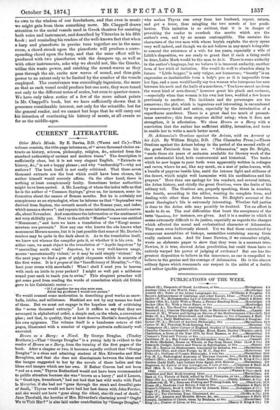Brown as a Berry: a Novel. By George Douglas. (Tinsley
Brothers.)—That "George Douglas " is a young lady is evident to the reader of Brown as a Berry, from the turning of the first pages of the 'book. After a chapter or two, it becomes equally evident that "George Douglas" is a close and admiring student of Mrs. Edwardes and Miss Broughton, and that she does not discriminate between the ideas and the images suggested to her by the novels of those ladies and the ideas and images which are her own. If Esther Craven had not been "red as a rose," Thyrza Rutherford would not have been recommended to public attention because she was" brown as a berry ;" and if Lenore, in "Good-bye, Sweetheart," had not had that last wild waltz with Paul le MCsurier, if she had not "gone through the strait and dreadful gate of deatti, Thyrza would not have had her last dance with John Ferrier, and she would not have "gone along the silent, star-lit road of death." Jane Theobald, the heroine of Mrs. Edwardee's charming novel" Ought We to Visit Her?" is also laid under contribution by "George Douglas," who makes Thyme run away from her husband, repent, return, and get a fever, thus mingling the two novels of her predi- lection. This imitation is SO evident, that it is in danger of provoking the reader to overlook the merits which are the author's own, and by no means contemptible. She sustains the characters of the two men with whose boyish exploits the story opens very well indeed, and though we do not believe in any man's being able to conceal the existence of a wife for ten years, especially a wife of Lilith's disposition, we are ready to grant that if such a thing could be done, Luke Mark would be the man to do it. There is some audacity in the author's language, but we believe it is innocent audacity, another form of her trick of imitation. She would do well to abandon slang in future. "Little beggar," is only vulgar, not humorous; "beastly" is an expression as inadmissible from a lady's pen as it is impossible from her lips, and a man wouldhardly say to a woman who interposes her arm between his neck and the knife of a murderer," You have saved me from the worst kind of sore-throat," however great his pluck and coolness, —especially when that woman is his own lost love, wedded a few hours previously to another. The incidents and the personages are too numerous; the plot, which is ingenious and interesting, is encumbered by unnecessary detail and action, especially by the introduction of a superfluous murderer. There is a great deal too much of present- tense narrative ; this form requires skilful using; when it does not strengthen, it is affectation. We close Brown as a Berry with a conviction that the author has sufficient ability, invention, and taste to enable her to write a much better novel.


































 Previous page
Previous page